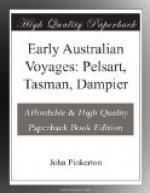It is very observable that all the mighty discoveries that have been made arose from these great men, who joined reasoning with practice, and were men of genius and learning, as well as seamen. To Columbus we owe the finding America; to Magellan the passing by the straits which bear his name, by a new route to the East Indies; to Le Maire a more commodious passage round Cape Horn, and without running up to California; Sir Francis Drake, too, hinted the advantages that might arise by examining the north-west side of America; and Candish had some notions of discovering a passage between China and Japan. As to the history we have of Roggewein’s voyage, it affords such lights as nothing but our own negligence can render useless. But in the other voyages, whatever discoveries we meet with are purely accidental, except it be Dampier’s voyage to the coasts of New Holland and New Guinea, which was expressly made for discoveries; and in which, if an abler man had been employed in conjunction with Dampier, we cannot doubt that the interior and exterior of those countries would have been much better known than they are at present; because such a person would rather have chosen to have refreshed in the island of New Britain, or some other country not visited before, than at that of Timer, already settled both by the Portuguese and the Dutch.
In all attempts, therefore, of this sort, those men are fittest to be employed who, with competent abilities as seamen, have likewise general capacities, are at least tolerably acquainted with other sciences, and have settled judgments and solid understandings. These are the men from whom we are to expect the finishing that great work which former circumnavigators have begun; I mean the discovering every part and parcel of the globe, and the carrying to its utmost perfection the admirable and useful science of navigation.
It is, however, a piece of justice due to the memory of these great men, to acknowledge that we are equally encouraged by their examples and guided by their discoveries. We owe to them the being freed, not only from the errors, but from the doubts and difficulties with which former ages were oppressed; to them we stand indebted for the discovery of the best part of the world, which was entirely unknown to the ancients, particularly some part of the eastern, most of the southern, and all the western hemisphere; from them we have learned that the earth is surrounded by the ocean, and that all the countries under the torrid zone are inhabited, and that, quite contrary to the notions that were formerly entertained, they are very far from being the most sultry climate in the world, those within a few degrees of the tropics, though habitable, being much more hot, for reasons which have been elsewhere explained. By their voyages, and especially by the observations of Columbus, we have been taught the general motion of the sea, the reason of it, and the cause and difference of currents in particular places, to which we may add the doctrine of tides, which were very imperfectly known, even by the greatest men in former times, whose accounts have been found equally repugnant to reason and experience.




